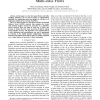Free Online Productivity Tools
i2Speak
i2Symbol
i2OCR
iTex2Img
iWeb2Print
iWeb2Shot
i2Type
iPdf2Split
iPdf2Merge
i2Bopomofo
i2Arabic
i2Style
i2Image
i2PDF
iLatex2Rtf
Sci2ools
138
click to vote
PIMRC
2010
IEEE
2010
IEEE
Self-optimizing routing in MANETs with multi-class flows
In this paper we show how game theory and Gibbs sampling techniques can be used to design a self-optimizing algorithm for minimizing end-to-end delays for all flows in a multi-class mobile ad hoc network (MANET). This is an improvement over the famed Ad-Hoc On-demand Distance Vector (AODV) protocol, that computes the routes with minimal number of hops for each flow in a multi-flow ad-hoc network. Here, the load of each flow is taken into account to choose the best route (in terms of delays) among a fixed number of routes. The algorithm can be implemented in a fully distributed and asynchronous way and is guaranteed to converge to the global optimal configuration. Numerous numerical experiments show that the gain over AODV, computed over a large number of networks, is quite substantial.
Ad-Hoc On-demand Distance | Communications | Mobile Ad Hoc Network | Multi-flow Ad-hoc Network | PIMRC 2010 |
| Added | 14 Feb 2011 |
| Updated | 14 Feb 2011 |
| Type | Journal |
| Year | 2010 |
| Where | PIMRC |
| Authors | Pierre Coucheney, Bruno Gaujal, Corinne Touati |
Comments (0)

